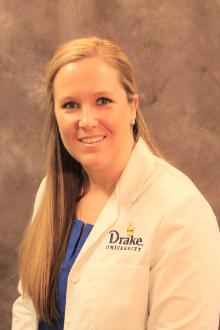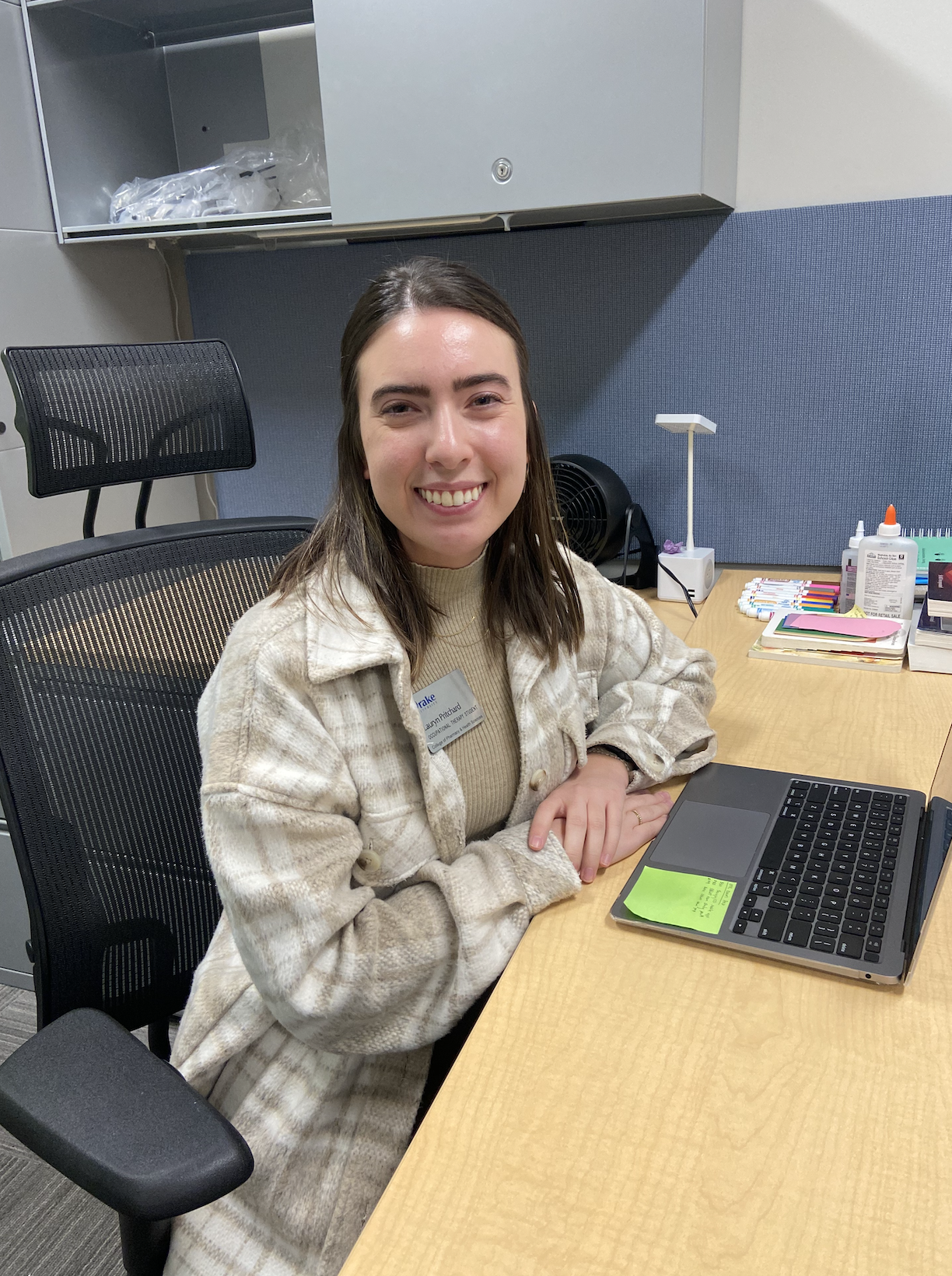Occupational Therapy Spotlight
Meet Carrie Behrends. Carrie is a third-year student in Drake's Occupational Therapy Doctorate (OTD) program. In her last year at Drake, Carrie had the opportunity to complete a fieldwork experience at Utah State Hospital in Provo, Utah.
 Name: Carrie Behrends
Name: Carrie Behrends Following high school in Cary, Illinois I completed my undergraduate degree at University of Montana in Missoula, Montana. I then spent almost 10 years in the Roaring Fork Valley outside Aspen, Colorado where I worked as a horseback outfitter in the Maroon-Snowmass wilderness, manager of a multi-million dollar transportation company, concierge at a private residences club, ranch hand on a private 7,000 acre ranch and various jobs. Lacking fulfilment in my career, I decided to return to graduate school at Drake and pursue a doctorate in occupational therapy. I completed my didactic work in Des Moines including four one-week fieldwork rotations in Kansas City, KS, Woodbury, MN, Rogers, AR, and Iowa City, IA. My Level II rotations were at Utah State Hospital in Provo, UT and Aspen Valley Hospital in Aspen, Colorado. My Doctoral capstone is my final rotation which I am currently completing in academia at Rocky Mountain College in Billings, Montana.
What is it about Occupational Therapy that attracts you? Why did you choose to pursue OT?
Occupational therapy is a client centered, humanistic profession that treats individuals of all abilities in all life stages. The ability to offer patients a holistic treatment that addresses body and mind attracted me to the profession. The diversity of practice settings and ability to work anywhere in the country/world also made this profession very attractive to me.
What are your professional goals as a future OT?
Mental health is a specialty area that I am very interested in. However, I appreciate the ability for occupational therapists to utilize our mental health training in all practice settings, not just specifically a mental health hospital or organization. My “dream job” is to own my own hippotherapy barn and treat patients through animal assisted therapy using a multidisciplinary approach.
Tell us about your experience at Utah State Hospital. What were your responsibilities and what did a typical day/week look like?
My level II A fieldwork was at Utah State Hospital in Provo, Utah, which is about one hour south of Salt Lake City. This is a lockdown forensics unit where I primarily worked with individuals who have either pled guilty and mentally ill (GMI) or not guilty by reason of insanity (NGI). These individuals have a severe mental illness and have also committed a crime and are at Utah State Hospital to participate in therapy in order to restore competency and potentially return to the community. This practice setting is primarily mental health while serving the patient holistically and offering treatment in many ways to best support the patient and reintegration into the community. This setting emphasizes the importance of Allen Cognitive Levels by assessing each new patient to determine their level of cognition which in turn determines their level of support.
I had a full case load at USH and treated patients independently including evaluations and documentation after two weeks at the setting. Safety was vital and I tailored my treatment sessions to reflect that. I planned and facilitated engaging, occupation based, and client-centered interventions. I designed and facilitated individual treatments and modified them as needed to ensure that progress was being made toward the patient's goals. I worked closely with a certified occupational therapy assistant (COTA) on the forensics unit to coordinate services and mentored a level I OTD student for one week. Common diagnoses I worked with included schizophrenia, schizoaffective disorders, bipolar disorders, personality disorders, substance abuse, depression and anxiety disorders, and dementia. I worked four days a week for 10 hours each day. I also had the opportunity to volunteer as a TA for a COTA class on my mid-week day off. While at USH, I took on the responsibility of representing occupational therapy during daily multidisciplinary meetings to advocate for occupational therapy services for patients.
How did Drake prepare you for your experience at USH?
Drake offered a mental health course that provided me vital information about common diagnoses in a mental health setting. This course also prepared me to create and facilitate group treatment sessions and to administer common screening and assessment tools specific to mental health.
What was your biggest lesson from this fieldword experience?
This site taught me how to maintain a safe working environment for myself and patients, while engaging them in meaningful occupations. I also learned how to show compassion for individuals in this specialized setting. Though many of them have committed crimes, it’s important to remember that they deserve fair and empathetic treatment, just as any other patient would receive.
What was your favorite part of being placed at USH?
I loved engaging patients in individual and group therapy sessions where I could create just-right challenges to best prepare them for their next placement. Two of my weekly treatment sessions included using the kitchen to teach patients how to create and read recipes and how to read food labels in order to independently create meals. My favorite memory was when I told my patient’s that I was ending my rotation at USH and one patient in particular who was very challenging, turned to another and said, “I am a better person because of her hard work and I’m really going to miss her.” This made me realize how much of an impact I made in the lives of the patients incarcerated at this facility.
Why did you choose to attend Drake?
I was accepted to several schools, but I ultimately chose Drake because the interview day made me feel more than a number and I felt really welcomed into the Drake community.
How are your experiences at Drake helping you to pursue your career goals?
It has been a tremendous opportunity to have the ability to treat a wide variety of patients and travel to many fieldwork locations which bolster my career goals. The opportunity to complete my capstone experience in academia will prepare me for a career in teaching while strengthening my technical OT skills.
Level II fieldwork experiences where I had the opportunity to treat patients with a full case load are helping me to become a confident and skilled practitioner for the future.
What are some of your accomplishments at Drake and in the OTD program?
While at Drake I served one year as Professional Development Chair of Drake University Student Occupational Therapy Association, one year as a member of the Student Government Association, and one year as President of Drake University Student Occupational Therapy Association. My volunteerism included therapy dog handler and facilitator, American Foundation for Suicide Prevention, Central Iowa ALS Society, Mosaic Group Homes, Drake University student panel, and Train to Inspire.
I was inducted as a member of the Drake University Honor Society for academic excellence for two years, was a member of poster development and presentation team for IOTA conference, and our group research was chosen to present at the national AOTA conference in 2020.
Share a few things you've liked most about your time at Drake and in the OTD program.
I enjoyed the opportunities we had to work within the community and implement occupational therapy practices as students. My favorite Drake memory was forming a bond and therapeutic relationship with an individual during my independent study where I was able to help prepare her for independent living in the community.
What is one piece of advice you would give to future OT students?
Make the most of the time you have with professors, clinicians, and professionals within classwork and while on fieldwork as these are invaluable learning experiences that will be unable to duplicate while working as a clinician.


